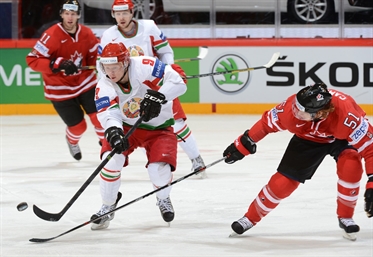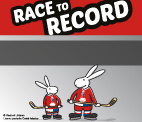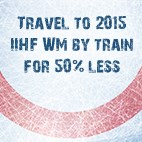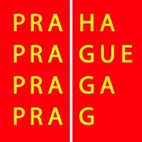Canada in control
Canada in control
Belarus heavy underdogs in QF

 Belarus' Vyacheslav Andryushenko and Canada's Brian Campbell battle for the puck in the 2013 IIHF Ice Hockey World Championship. Photo: Andre Ringuette / HHOF-IIHF Images
Belarus' Vyacheslav Andryushenko and Canada's Brian Campbell battle for the puck in the 2013 IIHF Ice Hockey World Championship. Photo: Andre Ringuette / HHOF-IIHF Images
Consider first that Canada has a perfect 7-0 record so far while Belarus has four wins and three losses (albeit two in overtime). Canada has scored a whopping 49 goals, more than seven a game, while Belarus has but 20, fewer than three a game. Goals against is a bit closer, Canada having surrendered 14 and Belarus 19.
“I think this is such a great opportunity for our guys to play against such a deep and skilled team like Canada,” said Belarus coach Dave Lewis as much as admitting the underdog role. “They have the best coaches and top players who can beat you one-on-one, with passing plays and shots. They can defend. They have every tool they need to succeed in this tournament.”
Historically, Canada has won all nine previous meetings, seven at World Championships and two at the Olympics, and the goals difference is impressive – 46-10.
But, of course, we play the games for a reason, and once the puck is dropped both teams have a chance of emerging victorious.
Since winning a silver medal in 2009 Canada has lost in the quarter-finals the last five years, an uncharacteristic drought it hopes to end this afternoon. Belarus made it to the quarters last year for the first time since 2009. Today’s winner will play the winner of the Finland-Czech Republic game.
“I’ve been on three of those teams,” Matt Duchene noted. “This is a tournament that has stuck with me because of that, and I know for a lot of other guys, it’s the same thing. So we want to get past the quarters and win it this year.”
Continue reading“The only thing I told the players many weeks ago was that we want to get to the next round of the tournament,” said Lewis, a Canadian by birth. “We felt we had the personnel and could do that.”
“Guys need to understand that the intensity is going to shift now,” Canadian forward Jason Spezza suggested. “It’s always hard to knock a team out. Belarus is a structured team. They play together during the season, so they’re going to pose different problems for us maybe than we’ve seen.”
“Of course, it’s a powerful team, one of the best in the tournament,” admitted Andrei Stepanov. “But I’m not a bookmaker, it’s not my job to calculate the odds. We’ll do everything we can to come out on top. Everyone will give his all. Of course we believe we can win. If we didn’t they would be no point in going out on the ice.”
Canada’s firepower has been one of the big stories of the tournament. All four lines have scored and provided coach Todd McLellan with a balanced attack. Currently the team has three players in the top five of the scoring race. Spezza and Matt Duchene are tied with two others atop the leaderboard with eleven points, and Jordan Eberle is one behind with ten. Taylor Hall has nine and captain Sidney Crosby, who rested one game and a full period in another, has seven.
The majority of the Belarus offence has come from three players, who account for nearly 50 per cent of the team’s scoring points: Alexei Kalyuzhny has five goals and ten points; Andrei Kostitsyn has two goals and nine points; and Sergei Kostitsyn has a goal and six assists.
McLellan has leaned more on Mike Smith in goal than Martin Jones. Smith is big and mobile and handles the puck like a third defenceman. Belarus also has a Canadian goalie, Kevin Lalande. He has played in six of his team’s seven games and posted a 2.17 goals-against average, so his play will go a long way to deciding his adopted country’s fate.
Of course, special teams will also be important. Canada played its first penalty-free game in more than 40 years two days ago and has incurred only 21 penalties all tournament, all 2-minute minors. And, Belarus has scored only four goals on the power play in 26 chances. Canada, on the other hand, has eight goals in 25 chances.
At the other end, Canada has surrendered only one power-play goal against to Belarus’s four.
Bottom line, all the names and numbers and history and opinion favour Canada, which may be to Belarus’s advantage. A goal or a bounce, a nothing-to-lose attitude or unforeseen intangible might make a world of difference to the underdogs.
“Anything is possible, and there’s no reason why we can’t give Canada a real game,” opined Andrei Stas. “They’ve got a skilful, experienced team and we’ll battle to do something with them. I never make predictions, but we’ll try to beat them. We’ll focus on playing our hockey.”
Back to Overview























































































